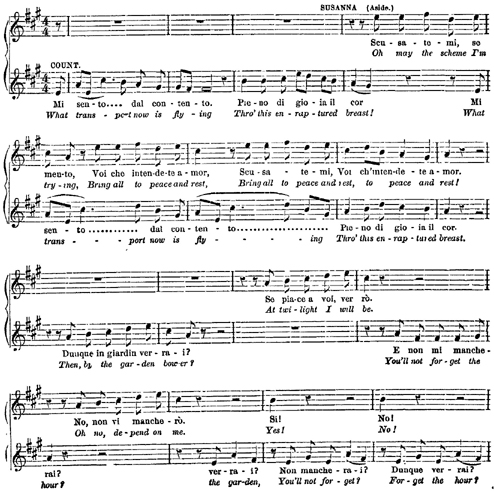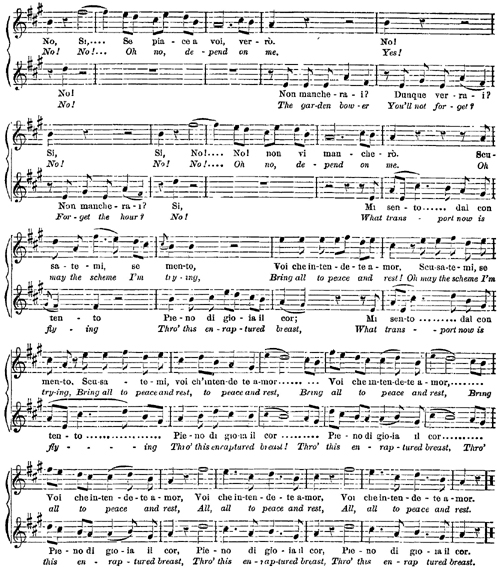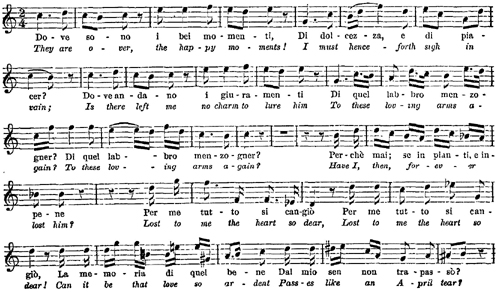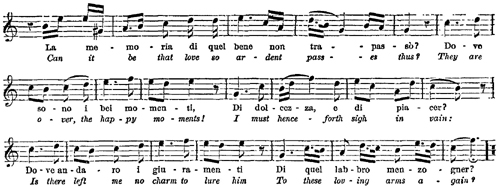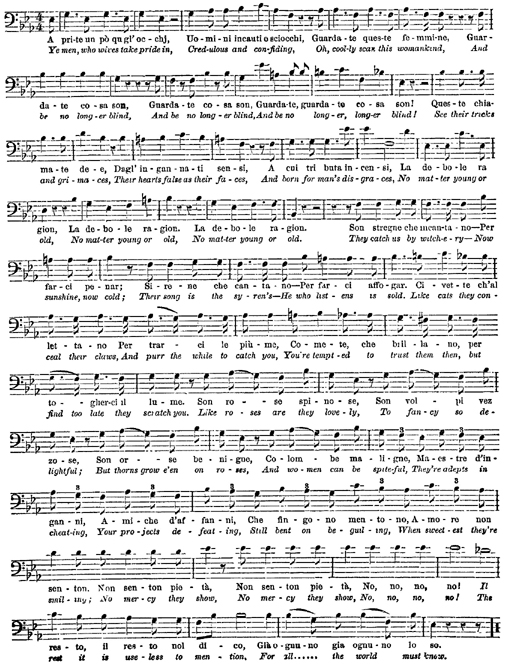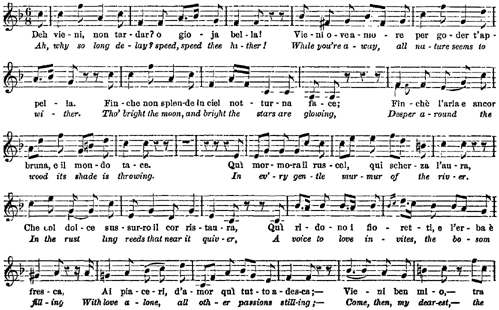LE NOZZE DI FIGARO.
(THE MARRIAGE OF FIGARO.)
ATTO I.
ACT I.
SCENA I.—: Camera quasi smobiliata con un seggiolone nel mezzo. Figaro sta misurando con una canna il pavimento per lungo e per largo. Susanna si aggiusta davanti uno specchio, un capellino della Contessa in testa.
SCENE I.—: A Room only half furnished; near the centre a large arm-chair. Figaro is discovered, measuring out a space with a rule, while Susanna stands before a large glass, trying on the Countess’s hat, and admiring herself.
Susanna e Figaro.
- Cinque—dieci—venti—trenta—
- Trentasei—quarantatre.
- Ora sì ch’io son contenta,
- Sembra fatto in ver per me.
- Cinque.
- Guarda un pò, mio caro Figaro.
- Dieci.
- Guarda un pòmio, caro Figaro.
- Venti.
- Guarda un pò.
- Trenta.
- Guarda un pò, guarda adesso il mio capello.
- Trentasei.
- Guarda adesso il mio capello.
- Quarantatre.
- Guarda un pò, mio caro Figaro!
- Guarda adesso, il mio capello.
- Sì mio core or è più bello,—
- Sembra fatto in ver per me.
- Ah! il mattino alle nozze vicino,
- Quanto è dolce al miotuo tenero sposo,
- Questo bel cappellino vezzoso—
- “Che Susanna, ella stessa si fè!”
- Cosa stai misurando.
- Caro il mio Figaretto?
- Io guardo se quel letto,
- Che ci destina il Conte,
- Farà buona figura in questo loco.
- In questa stanza?
- Certo, a noi la cede.
- Generoso il padrone.
- Io per me te la dono.
- Io non capisco.
- Perchè tanto ti spiace.
- La più comoda stanza del palazzo.
- Perch’io son la Susanna,
- E tu sei pazzo.
- Grazie, non tanti elogi!
- Guarda un poco, se potria.
- Meglio stare in altro loco.
Susanna and Figaro.
- Fourteen—sixteen—twenty—thirty.
- Six-and-thirty—yes, yes, ’twill do.
- Ah! the mirror tells me clearly,
- That the hat becomes me, too.
- Fourteen.
- Pray admire it, dearest Figaro.
- Sixteen.
- Pray admire it, dearest Figaro.
- Twenty.
- Pray admire.
- Thirty.
- Pray admire; it gives me pleasure.
- Six-and-thirty.
- Pray admire; it gives me pleasure.
- Yes, yes, ’twill do.
- Only see this hat, dear Figaro!
- Pray admire; it gives me pleasure.
- Yes, I see it plain, my treasure,—
- How the hat sits well on you.
- Oh! the happy and beautiful morning,
- When the heart with delight is beating,
- At the altar of love repeating—
- “Dearest one, I am ever now thine.”
- What makes you there so busy measuring,
- Dear Figaretto?
- I’m seeing if the couch, love,
- The Count intends to give us,
- Is suited well to stand in this same corner.
- In this apartment?
- Truly, his Lordship gives the room.
- To us, dear Susanna.
- I’ll have naught to do with it.
- I do not understand.
- Why you should thus object.
- To the pleasantest chamber in the palace.
- Why, because I’m Susanna,
- And you’re a booby.
- Thank you; but spare your flattery;
- See, now, if you can discover.
- A better situation.
Duetto.—Susanna e Figaro.
- Se a caso madama
- La notte ti chiama;
- Din, din! In due passi,
- Da quella puoi gir.
- Vien poi l’occasione,
- Che vuolmi il padrone,
- Don, don! in tre salti,
- Lo vado a servir.
- Così; se il mattino,
- [Ironica.
- Il caro Contino,
- Din, din!
- E ti manda tre miglia lontan,
- Din, din! Don, don!
- A mia porta il diavolo porta,
- Ed ecco in tre salti—
- Susanna, pian pian.
- Ascolta, in tre salti,
- Din, din! Don, don!
- Ascolta—
- Fa presto.
- Se udir brami il resto;
- Discaccia i sospetti che torto mi fan.
- Udir bramo il resto;
- I dubbj, i sospetti gelare mi fan.
- Discaccia i sospetti, i sospetti.
- I dubbj, i sospetti gelare mi fan.
- Or bene, ascolta, e taci.
- Parla, che c’è di nuovo?
- Il Signor Conte,
- Stanco d’andar, cacciando le straniere
- Bellezze forestiere:—vuole ancor
- Nel castello, ritentar la sua sorte.
- N’è già di sua consorte,
- Bada bene, appetito gli viene!
- E di chi dunque?
- Della tua Susannetta.
- Di te?
- Di me, medesma. E tucredevi,
- Che fosse la mia dote
- Merto del tuo bel muso!
- Menèria lusingato.
- [Suona un campanello.
- Che suona?—La Contessa.
- Addio—addio—addio—
- Figaro bello.
- Cotaggio; mio tesoro.
- E tu cervello.
- [Susanna parte.
- [Al se stesso] Bravo, Signor Padrone!
- Ora incomincio a capir il mistero;
- E a veder schietto,
- Tutto il vostro progetto.
- A Londra è vero? voi ministro—
- Io corriero—e la Susanna
- Secreta ambasciatrice.
- Non sarà—non sarà—
- Figaro il dice!
Duet.—Susanna and Figaro.
- By night, if my lady
- Should want you, you’re ready;
- Ding, dong! a few paces,
- And you’re close at hand.
- Or, if that the case be,
- His lordship should need me,
- Ding, dong! in three paces
- Before him I stand.
- No doubt; and some morning,
- [Ironically.
- Without any warning,
- Ding, dong!
- And his lordship will send you o’er sea,
- Ding, dong!
- Then the devil will lead him to me
- In less than three paces.
- Susanna, enough.
- But hear me. In a minute,
- Ding, dong!
- But hear me—
- Make haste, then.
- Well! mark, now, what follows;
- And leave me by evil suspicions unvex’d.
- Let’s hear, then, the sequel;
- And yet I cannot get me rid of these doubts.
- Abandon your doubtings, abandon misgivings.
- I cannot get free from suspicion and doubt.
- But now, sir, attend, and mark me.
- Speak, then; I’m all attention.
- It seems his lordship,
- Weaty of roaming forth in search of beauty,
- Has come to this conclusion:—it were better
- To seek it at home, in his castle.
- His wife is out of question;
- Only guess, then, who has now caught his fancy?
- It passes guessing.
- Why, your own Susannetta.
- Not you?
- Yes, I, so please you. Do you believe now,
- That his lordship gives my dowry
- Merely to pay your service!
- I really did suppose it.
- [A bell rings.
- Who rings there? ’Tis the Countess.
- Farewell—farewell—farewell—
- Farewell, Figaro dearest.
- Fear nothing; be of courage.
- And you too, madcap.
- [Exit Susanna.
- [To himself.] Bravo, my lord and master.
- I do begin, sir, to perceive your purpose;
- I’m blind no longer,
- But see through all your plottings.
- You go to London with despatches—
- I’m your courier—and our Susanna
- Ambassadress in secret.
- It shan’t be—it shan’t be:
- Figaro defies you!


SE VUOL BALLARE—HAPLY YOUR LORDSHIP. Figaro.
- Saprò, saprò, saprò, saprò, saprò;—
- Ma piano, piano, piano, piano, piano, piano, piano.
- Meglio ogni arcano,
- Dissimulando,
- Scoprir potrò.
- L’arte schermando,
- L’arte adoprando,
- Di quà pugnando,
- Di là scherzando,
- Tutto le macchine
- Rovescierò,—rovescierò.
Entrano Bartolo e Marcellina, con un contratto in mano, sequiti da Susanna, che ascolta al fondo.
Ed aspettate il giorno fissato per le nozze, a parlarmi di questo?
Io non mi perdo, dottor mio, di corraggio; per romper der sponsali più avanzati di questo—bastò spesso un pretesto; ed egli ha mecò, oltre questo contratto certi impegni—so io—basta! Convien con arte impunti, gliarla a rifiutare il Conte, egli per vendicarsi, prenderà il mio partito, e Figaro così fia mio marito.
Bene, io tutto farò! Senza riserva, tutto a me palesate. [A parte.] Avrei pur gusto di dar in moglie la mia serva antica, a chi mi fece un dì rapir l’amica!
- I know, I know, I know, I know, I know;—
- But piano, piano, piano, piano, piano, piano, piano.
- I shall learn better,
- All to the letter,
- If I am still.
- Jesting and laughing,
- Feasting and quaffing,
- Singing and playing,
- Compliments paying,
- All his close stratagems
- I shall find out,—yes, I’ll find out.
Enter Bartolo and Marcellina, with a Contract in her hand, followed by Susanna, who listens at the back.
But why have you awaited the day fixed for the marriage ere you mention this matter?
’Tis of the latest, doctor—that must be granted; and yet what signifies it? I have broken a marriage much more advanced than this is; for slander often, if well aimed, can work wonders. Know, this contract is not all—basta! Let’s first get the bride into disgrace. Were she but once persuaded to scorn Almaviva’s love-approaches, he then, from disappointment, would assist me, I’m certain, and Figaro compel to be my husband.
Bravo, good Marcellina; I’ll be your second, but from me you’ll keep nothing. [Aside.] What pleasure shall I find in foisting our cross antique duenna upon the knave who robbed me of my mistress.
Aria—Bartolo.
- La vendetta! O, la vendetta!
- E un piacer serbato ai saggi,
- Obbliar l’onte gl’oltraggi.
- Obbliar l’onte gl’oltraggi,
- E bassezza è ognor viltà.
- Coll’ astuzia, coll’ arguzia,
- Col giudizio, col criterio,
- Si potrebbe, si potrebbe,
- Il fatto è serio,
- Ma credete si sarà.
- Se tutto il codice dovessi volgere,
- Se tutto l’indice dovessi leggere,
- Con un equivico, con un sinonimo,
- Qualche garbuglio si troverà.
- Tutta Siviglia conosce Bartolo—
- Il birbo Figaro vinto sarò.
- [Bartolo parte.
[Sola.] Tutto ancor non ho perso; mi resta la speranza. Ma Susanna si avanza. [Susanna appare indietro, con una cuffia da notte, un nastro, ed una vesta da camera in mano.] Io vò provarmi—fingiam di non vederla. E quella buona perla lo vorebbe sposar.
Di mi favella.
Ma da Figaro al fine, non può meglio sperarsi?—“L’argent fait tout.”
[Avvanzandosi.] Che lingua! Manco male ch’ognun sa quanto vale.
Brava! questo è giudizio!—con quegl’ occhi modesti!—con quell’ aria pietosa! E poi—
Meglio è partir.
[Ironica.] Che cara sposa!
Air—Bartolo.
- Vengeance glorious! oh, vengeance glorious!
- There is nothing half so pleasant,
- In the past or for the present;
- None but folks of little merit
- Tamely suffer a wrong from man.
- Mask’d and smiling,
- All beguiling,
- I can manage greater matters,
- Than the fool who idly chatters,
- In my sure and quiet way.
- I’ll stop at nothing my purpose to carry,
- And break down the hope of the fools who would marry.
- With tricks and finesse all their projects defeating,
- And laugh, in the end, at what people say.
- Soon shall we see, then, who’ll victor be, then;
- Bartolo—Figaro—I, sir, or you.
- [Exit Bartolo.
[Alone.] Things look fairer than ever; I yet hope to defeat them. But Susanna is coming. [Susanna appears behind, with a ribbon, robe and head-dress in her hands.] Now, then, to try her—pretend I don’t observe her. Ah! what a priceless treasure Figaro now will wed.
Of me she’s speaking.
After all, he’s a barber, and what else could be hoped for?—“L’argent fait tout.”
[Advancing.] The serpent! Really, madam, you grow worse than ever.
Bravo! how mighty civil!—with that air so affected!—that assumption of virtue! In truth, Ma’am—
Better to go.
[Ironically.] What a nice wife!
Duetto.—Marcellina e Susanna.
- Via resti servita, madama brillante!
- Non sono si ardita—madama piccante.
- No; prima a lei tocca.
- No, no’ tocc’ a lei.
- Io so i dover miei;
- Non fo incivilità.
- La sposa novella!
- La dama d’onore!
- Del Conte la bella!
- Di Spagna l’amore!
- I meriti!
- L’abito!
- Il posto!
- L’eta!
- Per Bacco precipita.
- Se ancor, se ancor resto quà—
- Sibilla decrepita,
- Da rider mi fà.
- Via resti, &c.
- L’età, l’età, l’età!
- Da rider, da rider mi fà.
- [Marcellina parte.
- Va là, vecchia pedante! dottoressa arrogante!
- [Getta la vesta sul la seggiolone.
Entra Cherubino.
Susanetta, sei tu?
Son io; cosa volete?
Ah, cor mio!—che accidente!
Cor vostro! Cosa avvenne?
Il Conte ieri, perchè trovommi sol con Barbarina, il congedo mi diede; e se la Contessina, la mia bella comare, grazia non m’intercede, io vado via, io non ti vedo più, Susanna mia.
Non vedete più me? Bravo! ma dunque non più, per la Contessa segretamente il vostro cor sospira?
[Cherubino sospira.
Cos’ hai lì? dimmi un poco.
[Satiricamente.] Ah, il vago nastro e la notturna cuffia di comare si bella.
Deh, dammelo, Sorella; dammelo per pietà.
[Glielo strappa il nastro di mano.
Presto quel nastro!
O caro!—O bello, O fortunato nastro! Io non tel rendero che colla vita!
Cos’ è quest’ insolenza.
Eh, via! sta cheta, In ricompensa, poi, questa mia canzonetta io ti vò dare.
E che ne debbo fare?
Leggila alla Padrona—leggila tu, medesma—leggila a Barbarina, a Marcellina—leggila ad ogni donna del palazzo.
Povero Cherubino, siete voi pazzo?
Duet.—Marcellina and Susanna.
- Go first, I entreat you, Miss, model of beauty!
- Respect to the aged, Ma’am—I know my duty.
- No; first, if you please, Miss.
- I could not, indeed.
- I well know good manners;
- And pray you, proceed.
- Of maidens the fairest!
- Of old ones the rarest!
- His Lordship’s Susanna!
- So polished in manner!
- So lovely!
- So noble!
- So graceful!
- A form!
- I burst with vexation;
- If here I longer should stay—
- My dearest old woman,
- Don’t vex yourself, pray!
- Go first, &c.
- Ha, ha, ha! ha, ha!
- Don’t vex yourself, vex yourself, pray.
- [Exit Marcellina
- Farewell, spiteful old pedant—arrogant old doctor.
- [She throws the dress across the arm-chair.
Enter Cherubino.
Susanna, is it you?
Yes, I; but what’s the matter?
Ah, Susanna!—how unlucky!
Unlucky! What has happened?
His lordship found me alone this morning with our Barbarina, and dismissed me his service. Unless the gracious Countess, my beloved protectress, grants me her intercession, I’m lost for ever, and ne’er again shall see my own Susanna.
You will see me no more? Bravo! then no more you burn, sir, for the Countess? You breathe no longer your sighs for her in secret?
[Cherubino sighs.
What hast there? pray, now, tell me.
[Sarcastically.] Only the ribbon and cap that in the night time binds the head you respect so.
Ah, give it me, Susanna; in pity give it me.
[Snatching the ribbon from her.
Restore the ribbon.
Dear ribbon!—oh lovely, oh happy, happy ribbon! ne’er will I give thee back; no, not for millions!
Upon my word, you urchin!
Oh, be contented. In recompense, my dearest, I will give you this song of my composing.
And how am I to use it?
Read it unto the Countess—read it yourself, Susanna—read it to every damsel in the palace.
Poor Cherubino, you have lost your senses.

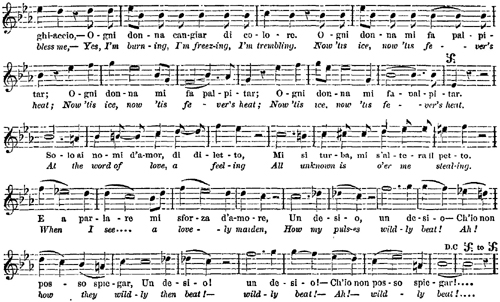
NON SO PIU COSA SON—AH, WHAT FEELINGS. Air. Cherubino.
- Parlo d’amor vegliando,
- Parlo d’amor sognando,
- All’ acqua, all’ ombra, ai monti,
- Ai fiori, all’ erbe, ai fonti,
- All’ acqua, all ombra,
- Ai monti, ai fiora,
- All’ eco—all’ aria—a venti,
- Che il suon de vani accenti,
- Portano via con se.
- E se non ho chi m’oda.
- Parlo d’amor con me.
Taci! vien gente! [Cherubino si nasconde dietro il seggiolone.] Il Conte?—Oh! me meschina!
Entra il Conte Almaviva.
Susanna! tu mi sembri agitata e confusa.
[Siede.
Signor, io chiedo scusa. Ma se mai quì sorpresa—per carità, partite!
Un momento, e ti lascio. Odi.
Non odo nulla.
Due parole. Tu sai che ambasciatore a Londra, il Re mi dichiarò, di condur meco Figaro destinai.
Signor, se ossassi—
Parla, parla, mia cara! E con quel dritto ch’oggi prendi su me, finche tu vivi, chiedi, imponi, presclivi.
Lasciate mi, Signor; dritti non prendo, non me vò, non ne intendo. Oh me, infelice!
Ah nò, Susanna, io ti vò far felice. Tu ben sai quanto io t’amo; a te Basilio tutti già disse. Or senti: se per pochi momenti, meco in giardin, sull’ imbrunir del giorno, ah per questo favore io pagherei.
[Fuori.] E’ uscito poco fa.
Chi parla?
O, Dei!
Esci; ed alcun non entri.
Ch’io vi lasci quì solo.
[Turbata.
[Fuori.] Da madama sarà, vado a cercarlo.
Quì, dietro mi porro?
Non vi celate.
Taci—e cerca, ch’ei parta.
Ohimè! che fate!
[Il Conte va a celarsi dietro il seggiolone, ma Susanna si pone destramente avanti di lui; e fa cenni a Cherubino il quale gira lestamente quasi carpone e si getta rannichiato nel seggiolone. Susanna lo copre colla vesta, che ha recata.
Entra Basilio.
Susanna, il ciel vi salvi! Avreste a caso veduto il Conte?
E cosa deve far meco il Conte?—animò, uscite.
Aspettate; sentite! Figaro di lui cerca.
Oh cielo! [Aparte.] Ei cercha chi, dopo voi, più l’odia.
[Aparte, dietro il seggiolone.] Vediam come mi serve.
Io non ho mai nella moral sentito, ch’uno ch’ami la moglie odii il marito. Per dir che il Conte v’ama!
Sortite! vil ministro de l’altrui sfrenatezza, io non ho d’uopo della vostra morale, del Conte, del suo amor.
Non c’è alcun male: ha ciascun i suoi gusti. Io mi crede a che preferir doveste per amante, come fan tutte quante un signor liberal, prudente, e saggio, a’ un giovinastro, a un paggio.
A Cherubino?
A Cherubino—Cherubin d’amore—ch’oggi sul far del giorno passeggiava quì intorno per entrar.
Uom maligno, un impostura è questa.
E un maligno con voi ch’ ha gli occhi in testa? E quella canzonetta!—ditemi in confidenza. [Confidente.] Io sono amico—ed altrui nulla dico. E per voi, per Madama?
[Aparte.] Chi diavol gliel’ ha detto?
A proposito, figlia, instruitelo meglio. Egli la guarda a tavola si spesso—e con tale immodestía, che s’il Conte s’accorge, e sul tal punto—sapete—egli è una bestia.
Scellerato!—e perche andate voi tai menzogne spargendo?
Io! che ingiustizia! quel che compro vendo! a quel che tutti dicono io non aggiungo un pelo.
[Il Conte si leva, turbato.
[Avvanzandosi.] Come; che dicon tutti?
[Aparte.] Oh bella!
Oh Cielo!
- Whatsoe’er I am doing,
- Whatsoe’er I’m pursuing,
- In sunshine or in showers,
- At home, or midst the flowers,
- In noontide bowers,
- Midst April flowers,
- I sigh—I pant—I languish,
- In bliss that throbs like anguish,
- Waking through night and day.
- Alas! I die with pleasure,
- Dreaming my life away.
Silence! there’s some one. [Cherubino hides behind the chair.] His lordship?—Oh me, unlucky!
Enter Count Almaviva.
Susanna! whence this terror? why this sudden confusion? [Seats himself.
[Agitated.] My lord, I pray excuse me. But suppose we are surprised now—for goodness’ sake away, away, sir.
But a moment, Susanna. Hear me.
I’ve ears for nothing.
Don’t be silly. I’m made ambassador to London, by the royal grace, and intend taking Figaro thither with me.
Might I presume, sir—
Surely, surely, my charmer! My greatest pleasure is to grant your requests, what form soever taking. Then speak them, my dearest!
Pray leave me to myself; favor I ask not, nor have I claims upon you. Ah me, unhappy!
No, no, Susanna. I wish to make you happy. You well know how I love you; surely. Basilio of this has told you. Now, mark me: say you’ll meet me, my dearest, when day is o’er, within the orange bower, and your kindness shan’t go without reward.
[Without.] He’s out, then?—never mind.
Who speaks there?
Oh, Heavens!
Quickly; give none admission.
Shall I leave you alone, sir?
[Troubled.
[Without.] With my lady, perhaps; there will I seek him.
Now, where to hide myself?
Pray, no concealment.
Silence—and send him off quickly.
Ah me! I’m ruined!
[The Count attempts to conceal himself behind the armchair, when Susanna interposes, and in the meanwhile Cherubino slips round and glides into it. Susanna then throws the dress over the latter.
Enter Basilio.
Susanna, I salute you. Pray, have you met with my lord this morning?
And what have I to do, then, with his lordship?—leave me, you booby.
Yes, directly; but learn that Figaro seeks him also.
Indeed, sir! [Aside.] He seeks his greatest foe, then, poor fellow.
[Aside, behind the chair.] I’ll see now how he serves me.
There you are wrong; it follows not in logic that he who loves the wife is foe to the husband. And how his lordship loves you!
Away, thou odious pander to the vice of another, for I despise you; preach your morals and logic to people like yourself.
No anger, beauty; we’ve all our fancies. I took for granted that you’d your sex’s likings and impressions, and would prefer for lover one of birth, in the prime of life and manhood, to beardless pages and striplings.
To Cherubino?
Yes, Cherubino—cherubim of goodness—who was observed this morning slily lurking in the passage to this room.
You malicious wretch! ’tis the grossest slander.
Is’t slander, then, with you to use one’s senses? And then our page’s song, too. [Speaking in confidence.] Come, let me share the secret. You know my friendship—I would never reveal it. Was’t for you or the Countess?
[Aside.] Who told him that, I wonder?
Apropos of the Page, now; he is much too incautious. Often at table his looks betray his passion—understand, for the Countess. Should his lordship observe it—he’s suspicious—you know him—he’d play the devil.
Wretched sland’rer!—tell me what delight you find in spreading such gross falsehood.
Nay, what injustice! I but say as others; nor do I add a syllable to what is talked on all sides.
[The Count rises with a troubled look.
[Coming forward.] Well, sir; what’s talked on all sides?
[Aside.] Delightful!
Oh heavens!
Terzetto.—Conte, Susanna, e Basilio.
Cosa sento?—Tosto, andate.
E scacciate il seduttor!
[Aparte.] In qual punto son quì giunto.
Perdonate, O mio Signor.
[Aparte.] Che ruina! me meschina!
Son oppressa dal dolor.
[Vacilla fingendo.
Ah! già svien la Poverino!
Come, o Dio, le batte il cor.
[La sostengono.
Pian, pianin su questo seggio.
[La vuol porre a sedere.
[Lo rispinge con forza.]
Dove sono? Cosa veggio!
Che insolenza—andate fuor!
Siamo quì, per ajutarti,
E sicuro il vostro onor.
Ah! del paggio quel che ho detto
Era solo un mio sospetto.
E un’ insidia!—Una perfidia!
Non credete a l’impostor.
Parta, parta, il damerino.
Poverino! poverino!
[Ironico.] Poverino! poverino!
Ma da me sorpreso ancor—
Come?
Che?
Da tua cugina,
L’uscio jer trovai rinchiuso;
Picchio, m’apre Barbarina
Paurosa fuor dell’ uso,
Io dal muso insospettito,
Guardo, cerco in ogni sito,
Ed alzando, plan, pianino
Il tappeto al tavolino,
Vedo il paggio.
[Alza, in imitazione, la vesta che copre il seggiolone, e scopre Cherubino.
Ah, cosa veggio!
Ah, crude stelle!
Ah, meglio ancora!
Onestissima Signora!
Accader non può di peggio.
Or capisco come và.
Giusti Dei, che mai sarà?
Così fan tutte le belle,
Non c’è alcuna novità.
[Cherubino ch’ è fin quì rimaso rannichiato nel seggiolone, si leva su, quasi a sedere.
Basilio, in traccia tosto di Figaro volate: Io vò che veda—
Ed io che senta. Andate.
[Con sicurezza.
[A Basilio.] Restate. [A Susanna.] Che badanza! e quale scusa, se la colpa è evidente?
Non ha è uopo di scusa un’innocente.
Ma costui quando venne?
Egli era meco quando voi quì giungeste; e mi chiedea d’ impegnar la Padrona a interceder gli grazia, il vostro arrivo in scompiglio lo posse; ed allor in quel loco si nascose.
Ma s’io stesso m’assisi, quando in camera entrai?
Ed allora di dietro io mi celai.
E quando ic là mi posi?
Allor io pian mi volsi, e qui m’ascosi.
Oh cielo! dunque hai sentito quello ch’io ti dicea.
Feci per non sentir, quanto potea.
[A Susanna.] Oh! perfidia!
[Arrestandolo.] Frenatevi;—vien gente.
Entra Figaro.
[Prende per uno braccio Cherubino, e lo mette in piede.] E voi restate quì, picciol serpente.
Coro.
- Giovani liete,
- Fiori spargete,
- Davanti al nobile,
- Nostro Signor:
- Il suo gran core
- Vi serba intatto,
- D’un più bel fiore
- L’almo candor.
- [A segno dal Conte, partono Coro, e Barbarina. Susanna, Cherubino, Basilio, Figaro e Il Conte, restano.
Evviva! evviva! evviva!
[A Cherubino, che sta afflitto.] E voi non applaudite?
E’afflitto, poveretto, perche il padron lo scaccia dal castello.
[Al Conte.] Ah! in un giorno si bello?
[Al Conte.] In un giorno di nozze?
[Al Conte.] Quando ognuno v’ammira?
[S’ inginocchia.] Perdon, mio Signor.
Nol meritate.
Egli è ancora fanciullo.
Men di quel che tu credi.
E ver mancai; ma dal mio labbro alfine—
Ben, bene, io vi perdono; Anzi farò di più; vacante è un posto d’uffizial nel reggimento mio; io scelgo voi. Partite tosto, Addio.
Ah! fin domani sol.
No; parta tosto.
A ubbidirvi, Signor, son già disposto.
[Ironico a Cherubino.] Via, per l’ultima volta la Susanna abbracciate. [Aparte a Basilio.] Inaspettato è il colpo.
[Partono Il Conte e Basilio.
[Interrompendo Cherubino, chi va per baciare Susanna.] Ehi, capitano; a me pure la mano. Io vo parlarti pria che tu parti. [Con gioia finta] Addio, picciolo Cherubino; come cangia in un punto il tuo destino!
Terzetto—Count, Susanna, and Basilio.
How! what hear I?—no delay, then!
Go and drive him, the rascal, hence!
No delay, then, but drive him quick from hence!
[Aside.] Let Basilio mercy pray, then;
Youth excuses such light offence.
[Aside.] What misfortune! how unlucky!
Surely we are at the worst.
[Pretends to be fainting
Ah! poor girl, she’s really fainting;
Her bosom throbs as if ’twould burst.
[Supporting her.
Gently, gently; sit you down there.
[Endcavoring to place her in a chair.
[Repulsing them.]
Heav’ns! where am I? what presumption!
Have you dat’d—but hence, away!
Trust me, we are come to help you;
Do, Susanna, be quiet, pray.
What I hinted of the page here
Turns out nothing, I now engage, dear.
Oh! insidious!—oh! man perfidious!
Don’t believe what he can say.
No, he goes; in vain you clamor.
Poor young fellow!
[Ironically.] Poor young fellow!
Yesterday, I caught the knave—
How, then?
How?
Why, at your cousin’s.
Yes; the door was locked and bolted.
Gently then I knock’d, when Barbarina
Most unwilling open’d.
This awak’d suspicion sleeping,—
All around me I go peeping,—
Then I gently raise the cover
From the table, and there discover—
[In saying this, he imitates the action described by lifting the dress from the arm-chair, when he discovers the Page.
Cherubino!
I’m all amazement!
We’re lost for ever!
Well, sure, I never!
So, my modest, chaste Signora!
Everything to-day goes crossly.
Now I understand, my friend.
Gracious pow’rs! how will it end!
That is still the way with women,
Ever faithless, full of wiles.
[Cherubino, who has till now remained crouched in the chair, raises himself up, as if seated therein.
Basilio, now hasten; say to our Figaro I want him.
I’d have him witness—
[With a confident air.] And so would I, too. Away, then.
[To Basilio.] Remain, sir. [To Susanna.] What excuse now? or what evasions, when the proofs are so pregnant?
Oh, sir, innocence needs not an evasion.
But how, then, came he hither?
Why, he was here already, ere you appeared, sir; and came to beg me to solicit my lady’s friendly intercession, when your approach confus’d and alarm’d him. In his terror he hid then where you found him.
I myself sate me down there when I enter’d the chamber.
Gliding quick from behind, I then conceal’d me.
And when I came round there, too?
I slipp’d back then unnotic’d, and hid again, sir.
You scanip! it seems, then, you listen’d to all that I was saying.
Really, I did my best, sir, not to listen.
[To Susanna.] Oh! you traitress.
[Interrupting him.] Restrain yourself;—our bride groom.
Enter Figaro.
[Pushing Cherubino out of the chair, and seating him self.] Don’t dare to move a step, you little serpent
Chorus.
- Greet him with flowers,
- Torn from May bowers,
- Wet with the summer show’rs,
- Children of Spring;
- Freely he gives you
- Blossoms much dearer,
- Ev’ry heart nearer—
- Dance, then, and sing.
- [At a sign from the Count, Barbarina and the Chorus go off, while Susanna, Cherubino, Basilio, Figaro, and the Count remain.
Evviva! evviva! evviva!
[To Cherubino, who looks sad.] And why don’t you applaud, sir?
Poor fellow, he is grieving because his lordship bids him quit the castle.
[To the Count.] How! on a morning like this, too?
[To the Count.] On the morning of our wedding?
[To the Count.] When all join in your praises?
[Kneeling.] Your pardon, good my lord.
You don’t deserve it.
He is yet a mere stripling.
Not so young as you fancy.
I own my fault, sir,—pray hear my now protesting.
Well, well, you are forgiven. Nay, more than that I’ll do: a post is vacant in my own regiment—the post of ensign—’tis yours, my friend. Away, and quickly. Adieu.
Give till to-morrow, sir.
No; off directly.
To obey you, my lord, I’m ever ready.
[Ironically, to Cherubino.] Come—now, then, for the last time, embrace your dear Susanna. [Apart, to Basilio.] This blow was unexpected.
[Exeunt Count and Basilio.
[Intercepting Cherubino, as he goes to kiss Susanna.] Hold, gallant captain; to me, now, pray address you. I wish to give a word of advice, sir. [With feigned joy.] Farewell, my excellent Cherubino; What a change a moment makes in all your fortunes!
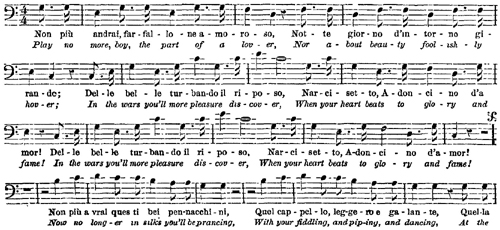
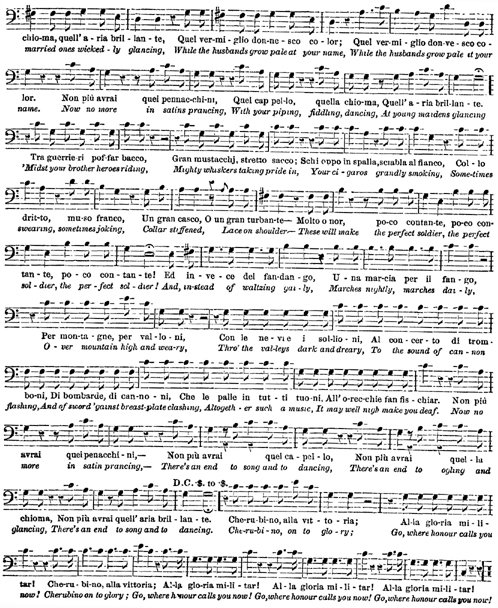
NON PIU ANDRAI—PLAY NO MORE. Air. Figaro.
SCENA II.—: Magnifica Camera con alcova da letto al fondo. Allato alt’ alcova, alla sinistra degli attori porta pratticabile di un gabinetto; dalla parte opposta fineetra pratticabile. A sinistra, alla quinta di mezzo, porta di entrata; dal lato opposto, all’ ultima quinta, porta di un gabinetto. Varie sedie.
SCENE II.—: A magnificent Chamber, with an alcove. At the side of the alcove, on the right hand, an outer door leading to a cabinet; on the left, a window; at the upper end, a door which leads to an inner chamber; on the opposite side, the door of a cabinet. Various seats.
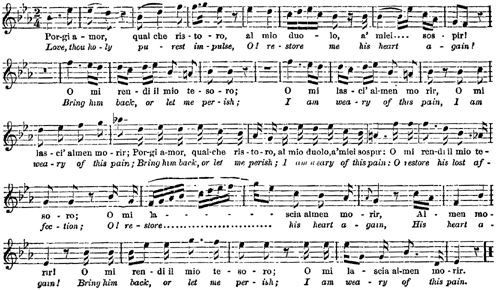
PORGI AMOR—LOVE, THOU HOLY. Air. Countess.
Entra Susanna.
[Siede.] Vieni, cara Susanna, finiscimi l’istoria.
E già finita.
Dunque volle sedurti?
O, il Signor Conte non fa tai complimenti colle donne mie pari; egli venne a contratto di danari.
Ah, il crudel più non m’ama!
E come poi è geloso di voi?
Come lo sono i moderni mariti. Per sistema infedeli, per genio capricciosi, e per orgoglio, poi tutti gelosi. Ma se Figaro t’ama, ei sol pria.—
Entra Figaro, cantante.
La, la, la, la, la, la!
Eccolo. Vicni, amico—madama è impaziente.
A voi non tocca, stare in pena per questo! Alfin di che si tratta? Al Signor Conte piace la sposa mia.
Ed hai coraggio di trattar scherzando un negozio si serio?
Non vi basta, che scherzando io ci pensi? Ecco il progetto. Per Basilio un biglietto io gli fo capitar, che l’ avvertisca di certo appuntamento, che per l’ora del ballo a un’ amante voi deste.
O ciel! che sento! ad un uom si geloso!
Ancora meglio, cosi potrem più presto imbarazzarlo, confonderlo, imbrogliarlo, rovesciargli i progetti.
E ver, ma in di lui vece s’ opporra Marcellina.
Aspetta; al Conte farai subito dir, che verso sera attendati in giardino; il picciol Cherubino, per mio consiglio non ancor partito, da femmina vestito, faremo che in sua vece ivi sen vada. Questa è l’ unica strada, onde monsù, sorpreso da madama, sia costretto a far poi quel che si brama.
[A Susanna.] Che ti par?
Non c’ è mal.
Nel nostro caso—
Quand’ egli è persuaso—e dove è il tempo?
Ito è il Conte alcaccia e per qualch ’ora non sarà di ritorno; io vado, e tosto Cherubino vi mando; lascio a voi la cura di vestirlo.
E poi?
E poi? [Cantante.]
Se vuol ballare, signor Contino,
Il chitarrino le suoneiò—
Si, le suonerò.
[Parte Figaro.
Quanto duolmi, Susanna, che questo giovinetto abbia del Conte le stravaganze udito! Ah! tu non sai—ma per quel causa mai da me stessa ei non venne? Dov’ è la canzonetta?
Eccola appunto, facciam che si la canti. Zitto—vien gente—è desso!
Entra Cherubino.
Avanti, avanti, Signor uffiziale!
Ah! non chiamarmi con nome si fatale; ei mi rammenta, che abbandonar degg’ io comare tanto buona.
E tanto bella?
[Contraffacendolo.] Ah! sì!—certo!
[Contraffacendolo.] Ah! sì!—certo. Ipocritone! Via presio la canzone, che stamane a me deste—a madama cantate.
Chi n’ è l’autor?
Guardate! egli ha due braccia di rossor sulla faccia!
Prendi la mia chitaria, e l’accompagna.
Io sono si tremante!—ma se Madama vuole—
[Contraffacendolo.] Lo vuolesi!—lo vuol; manco parole.
Enter Susanna.
[Seating herself] Hither, my good Susanna, and finish now your story.
’Tis told already.
He sought, then, to seduce you?
Oh, no; his lordship would ne’er confer such favors on the lowly and simple: but he means to be present at our marriage.
Ah, he loves me no longer!
Then whence his jealousy, always on the watch?
Your modern husbands all act in this fashion. They are on system faithless, changeful from disposition, while from their pride, child, they are no less jealous. But, if Figaro loves thee, by his assistance—
Enter Figaro, singing.
La, la, la, la, la, la!
Here he is. Now, my dearest—my lady’s impatient.
There’s no occasion—no, not the least, my jewel! But let’s discuss the matter. His gracious lordship is pleas’d to love Susanna.
And you’ve the courage to go on joking with a matter so serious?
Never mind me; ’tis my nature to be joking. But mark my project: through Basil’, I sent my lord a letter, in which I gave him notice of a certain assignation made by you for the ball of this evening.
Good Heavens! what madness!—to one who’s still so jealous!
’Tis all the better; for thus we hope the sooner to confound him, embarrass him, and delude him.
’Tis well; but in my lady’s stead send old Marcellina.
Contented; so be it. Meanwhile, then, I’ll tell my lord that at nightfall you’ll meet him in the garden; and little Cherubino, my ready pupil, putting Edition: current; Page: [15] off his journey, and mask’d in female habit, shall in your place go thither, dearest Susanna. Trust me, there is no better way. Once surpris’d and caught in his misdoings, he’ll be glad to comply with all our wishes.
[To Susanna.] What think you?
Not amiss.
Perplex’d as we are—
If we can persuade him—the time for action?
Why, the Count is gone hunting, and until nightfall will scarce think of returning. I’m off now, and quickly Cherubino will send you; for to you I leave it to disguise him.
And what next?
Why, then—[Singing.]
If you’re for dancing, trust me, good master,
I’ll to your prancing play up a tune—
Yes, play up a tune, sir—
[Exit Figaro.
How it pains me, Susanna, to think that Cherubino should have o’erheard the Count thus himself exposing. I wonder wherefore our Page comes not to seek me; he’s full of youthful fancies. But where’s his canzonetta?
Here it is; and, when he appears, I’ll make him sing it. Gently—a footstep—he’s coming!
Enter Cherubino.
Approach, approach now, most chivalrous commander!
Ah, never give me that title so detested; it still reminds me that I must needs abandon my dear and kind protectress.
And one so lovely.
[Sighing.] Oh yes!—surely!
[Mocking him.] Oh yes!—surely! Ah, you deluder! But now, sir, for the ballad which this morning you gave me—sing it, pray, to the Countess.
Who wrote the song?
Oh, look, now, my lady! only see how page-like he blushes!
Take my guitar, and play to our minstrel’s singing.
I’m all in such a tremble!—but, if madam commands it—
[Mocking him.] Poor little boy!—Oh yes, my lady wills it.
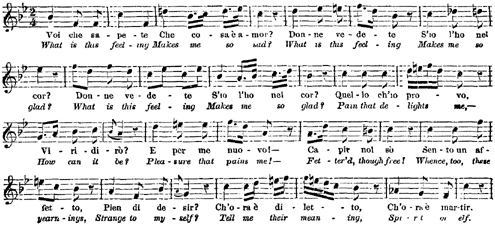
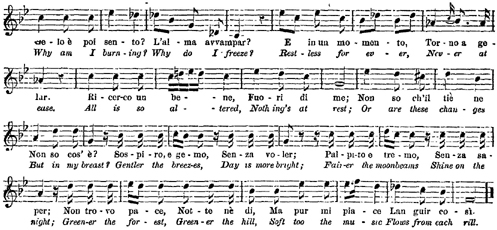
VOI CHE SAPETE—WHAT IS THIS FEELING. Air. Cherubino.
Presto a noi, bel soldato; Figaro v’informò—
Tutto mi disse.
Lasciatemi veder. [Osservando Cherubino.] Siam d’eguale statura. Giù quel manto.
[Gli leva il manto.
Che fai?
Niente paura!
E se qualcuno entrasse?
Entri, che mal facciamo? La porta chiuderò. [Va a chiudere la porta.] Ma [Editor: illegible word] poi acconciargli i capelli?
Una mi cuffia prendi nel gabinetto—presto. [A Cherubino, come Susanna entra nel gabinetto.] Che carta è quella?
La patente—
Che sollecita gente!
L’ ebbi or da Basilio.
Della fietta obbliato hanno il sigillo.
[Rende la patente a Cherubino.
[Con una cuffia.] Il sigillo di che?
Della patente.
Cospetto! che premura! Ecco la cuffia!
Spicciati!—Va bene; miserabili noi, se il Conte viene.
[Susanna siede vicino alla Contessa; Cherubino se le inginocchia davanti, e Susanna gli mette la cuffia.
Come you hither, my soldier; Figaro has told you—
Every thing, Susan.
That’s well. Now let me see. [Standing back to back with Cherubino.] ’Twill do to a nicety. We are equal in stature. Doff your mantle.
[Takes off his cloak.
What mean you?
Oh, don’t be frightened.
If any one should enter?
Well, ma’am, what does it matter? I’ll fasten, though, the door. [Goes to shut the door.] But how to trim up our lady with ringlets?
Why, you can take a head-dress of mine from yonder closet [To Cherubino, as Susanna goes to the cabinet.] What paper’s that, sir?
My commission—
They’re in a marvellous hurry.
From Basitio, this moment—
In their haste, too, they have quite forgot to seal it.
[Giving it back to him.
[Re-entering.] Have forgot to seal what?
Why, the commission.
Cospetto!—But no matter. Here is the head-dress.
Behold it!—be speedy; if the Count find him here, he’ll ne’er forgive us.
[Susanna takes a seat by the Countess; Cherubino kneels before her, and Susanna places the cap on his head.
Aria.—Susanna.
- Venite, inginocehiatevi,
- Restate fermo lì;
- Pian, piano or via giratevi;
- Bravo! va ben così.
- La faecia ora volgetemi;
- Olà! quegli occhi a me;
- Drittissimo, guardatemi.
- Madama quì non è.
- Restate fermo lì.
- Più alto quel colletto—
- Quel ciglio un pò più basso;
- Le mani sotto il petto,
- Vediemo poscia il passo?
- Quando sarete in piè;
- Vedremo poscia il passo!
- [Alla Conte.
- Mirate il bricconcello,
- Mirate quanto è bello!
- Che furba guardatura!
- Che vezzo, che figura!
- Se l’amane le femmine,
- Han certo il lor perchè.
Finiam le ragazzate; or quelle maniche oltre il gomito gli alza, onde più agitatamente l’abito gli si adatti.
Ecco.
[Susanna eseguisce.
Più indietro così. Che nastro è quello?
[Cherubino lo ha legato al braccio.
E quel ch’ esso involommi.
[Parte Susanna col manto di Cherubino.
Allorche un nastro legò la chioma, ovver toccò le pelle—d’ oggetto.
Son sola—Ah sì son sola.
[Si piechia fuori.
[Di fuori.] Perchè chiusa?
Il mio sposo—[Si alzano agitati.] Oh Dei! Son morta! Voi quì senza mantello—in questo stato!—un ricevuto foglio—la sua gran gelosia!
[Di fuori.] Cosa indugiate?
Son sola—Ah sì son sola.
A chi parlate?
A voi certo, a voi stesso.
[Confusa.
Dopo quel ch’è successo—il suo furore! Non trovo altro consiglio.
[Corre a celarsi nel gabinetto.
Ah! mi defenda il cielo in tal periglio!
[Leva la chiave dal gabinetto, e corre ad aprire il Conte, che entra.
Che novità? Non fu mai vostra uzanza di rinchiudervi in stanza.
E’ver! ma io—io stava quì mettendo—
Via mettendo?
Certe robe. Era meco la Susanna—che in sua camera è andata.
Ad ogni modo voi non siete tranquilla. [Esaminandola, e mostrandola una lettera da Figaro.] Guardate questo foglio.
Numi! è il foglio, che Figaro gli scrisse.
[Si fa rumore nel gabinetto don’ è Cherubino.
Cos’ è cotesto strepito? In gabinetto qualche cosa e caduta.
[Più confusa.] Io non intesi niente.
Convien che abbiate i gran pensieri in mente.
Di che?
La v’e qualcuno.
Chi volete che sia?
Lo chiedo a voi, io vengo in questo punto.
Ah si! Susanna appunto—
Che passò, mi diceste, alla sua stanza.
Alla sua stanza, o quì—non vidi bene.
Susanna?—e d’onde viene che siete si turbata?
Per la mia cameriera.
Io non so nulla, ma turbata senz’ altro.
Ah, quella serva, più che non turba me, turba voi stesso.
E’ vero, è vero. E la vedrete adesso.
Susanna esce dalla sua camera [Editor: illegible word] una vesta, ed ascolta indietre
- Susanna, or via sortite;
- Sortite così vò.
- Fermatevi—sentite!
- Sortire ella non può.
[Alla porta.] Dunque parlate almeno.
Non vo’, tacete.
Dunque voi non aprite?
E perche deggio le mie camere aprir?
Ebben Iasciate; l’aprirem senza chiavi. [Irritamente.] Ehi gente!
Come! porreste a repentaglio d’una dama l’onore.
E vero; io sbaglio. Voi la condiscendenza di venir meco avrete—Madama, eccovi il braccio. Andiamo.
Andiamo.
[Alzando la voce.] Susanna stara quì fin che torniamo.
[Partono—Susanna esce e va alla porta del gabinetto.
Aria.—Susanna.
- Come hither, page, and kneel you down,
- And look me in the face;
- But keep you still—you’d better, sir,—
- Bravo! he mends apace.
- Once more I’d have you look at me;
- Come, this way turn your head;
- You little rogue, we’ll drive you hence,
- Unless you mind what’s said.
- Still, I advise you, sir—bravo!
- Now let me view you nearer.
- This cap shows off your graces;
- But, when you move, remember
- To moderate your paces.
- Now rise and walk about;
- The rogue looks so demurely.
- [To the Countess
- He’ll win each maiden surely,
- His eyes so full of lustre!
- Smile that never misses,
- Edition: current; Page: [17]
- And lips all made for kisses,—
- So lovingly they pout.
Complete his transformation. Tuck up his sleeves, now, above his elbows, I play you, so that the dress may sit upon him with grace and lightness.
Yes, Ma’am.
[Susanna does as desired.
A little higher. [Sees a ribbon round his arm.] What ribbon’s that, sir?
The one he stole from me, sure.
[Susanna goes off with Cherubino’s mantle.
Oh, when a ribbon has bound the hair up, or only touch’d the skin of—of some one.
This is folly; I request you’ll give over.
[A knocking.
[Without.] Why shut in thus?
My husband! [They come forward, flurried.] Good heavens! I’m ruin’d—you here, stripp’d of your mantle—in such condition—that most unlucky letter—he so prone to suspicion.
[Knocking.] Why don’t you open?
What is it? I’m by myself here.
You spoke to some one?
To you, sir—only to yourself, sir.
[Affecting composure.
Oh, his rage will be dreadful—what’s to be done now? This way alone is left me.
[Cherubino runs to hide himself in the cabinet.
Into what peril has my folly run me!
[Takes the key out of the cabinet, and goes to open the door to the Count.
[Entering.] What fancy’s this? you were not used till now, Ma’am, thus to lock yourself in here.
’Tis true; but then I was busy, sir, arranging.
Arranging what?
Certain dresses. And Susanna was assisting—she’s now gone to her chamber.
And yet it seems, Ma’am, you do not feel too easy. [Eyeing her keenly, and giving her Figaro’s letter.] I pray you read that letter.
Heavens! the letter that Figaro would send him.
[Cherubino upsets a chair in the cabinet.
What noise is that in yonder room? I’m sure a table, chair, or something has fallen.
[More confused] Fallen, sir?—I did not hear it.
You must be thinking most profoundly, Madam.
Of what?
Him that is yonder.
May I ask who it is, sir?
That you must answer, since I have just now entered.
Oh yes; why not, sir?—Susanna—
Who, you told me, went this moment to her chamber.
Yes, her own chamber, or that—I can’t be certain.
Susanna!—and why, then, seem you in such perturbation?
’Tis for her I’m flurried.
I’m in the dark still. But ’tis plain you’re confounded.
Truly, it seems that my maid disturbs you more than she does me, sir.
You’re right, precisely. And now this question to settle.
Enter Susanna, with a dress over her arm, who listens at the back of the stage, and observes what is passing.
- Come forth, come forth, Susanna;
- Come forth, I say again.
- No, stay within—for shame, sir,—
- You call for her in vain.
Then speak, at least.
[At the door
I will not—hush!
Then, it seems, you won’t open?
And wherefore should I do a thing so absurd?
I ask no longer; I can do without you. [Angrily.] Who waits there?
How, sir? you will not surely take a freedom so indecorous?
You’re right, ma’am; I own it. Pray be so condescending as to come with me a moment; my arm is quite at your service. Let’s go, ma’am.
Let’s go, sir.
[Raising his voice.] Susanna here will wait for our returning.
[Exeunt—Susanna goes to the door of the cabinet.
Duetto.—Susanna e Cherubino.
- Aprite, presto aprite,
- A prite, è la Susanna;
- Sortite, sortite, sortite,
- Via sortite,
- Andate via di quà.
- Ahime! che scene orribile!
- Che gran fatalità!
- Partite, non tardate!
- Le porte son serrate.
- Le porte son serrate.
- Che mar sarà.
- Quì perdersi non giova.
- V’uccide, se vi trova.
- M’uccide, se mi trova.
- Veggiamo un po quì fuori!
- [Andando alla finestra, pretendente di saltar giù.
- Dà proprio nel giardino?
- Fermate, Cherubino;—
- Fermate, fermate, per pietà!
- Un vaso, o due, di fiori;
- Più mal non avverrà.
- Tiopp’ alto per un salto;
- Fermate per pietà.
- Quì perdersi non giova.
- Fermate, Cherubino!
- M’uccide, se mi trova!
- Troppo’ alto per un salto—
- Fermate per pietà!
- Lasciami.
- Pria di nuocerti, nel fuoco volerei!
- Abbraccio te per lei!
- [Bacia Susanna.
- Addio! Così si fa!
- [Sorte dalla finestra e salta giù.
- Ei va a perire, O Dei!
- Fermate, pietà!
- Fermate, fermate!
Oh! guarda il demonietto, come fugge! è già un miglio lontano Ma non perdiamei invano; entriam nel gabinetto; venga poi lo smargiasso; io quì l’aspetto.
[Entra nel gabinetto e ferma la porta.
Rientra il Conte chi porta in mano una leva. La Contessa l’accompagna.
Tutto e come il lasciai; volete dunque aprir voi stessa, o deggio?
Ahimè! fermate, e ascoltatemi un poco; mi credete capace di mancar al dover?
Come vi piace; entro quel gabinetto; che v’e chiuso vedrò!
Sì, lo vedrete, ma uditemi tranquillo.
Non è dunque, Susanna?
E un fanciullo.
Un fanciul?
Si: Cherubino.
E mi farà il destino ritrovar questo paggio in ogni loco? Come—non è partito? scellerati—ecco i dubbj spiegati! ecco l’imbroglio—ecco il raggiro onde m’avverti il foglio.
Duet—Susanna and Cherubino.
- Be quick, dear Cherubino;
- Quick, open; ’tis Susanna.
- Now hasten, now hasten, now hasten.
- ’Tis Susanna
- Now haste away from here.
- But where shall I betake myself?
- I see no refuge near.
- You must not stop a minute.
- [Trying the door.
- How? lock’d; the deuce is in it.
- ’Tis lock’d? the deuce is in it
- If affairs don’t mend, how will it end?
- I’m in a pretty way now.
- He’ll kill you if he finds you.
- I’ve no desire to stay now.
- This comes of love’s devotion!
- [Going to the window, and making signs, as if about to leap out.
- How far off lies the garden?
- Oh, pray give up that notion;—
- ’Tis twenty, full twenty feet below!
- No matter; I defy it.
- Take heart; for down I go.
- No, no; you must not try it;—
- ’Tis twenty feet below.
- Yet still I needs must try it.
- Oh, pray give up that notion.
- There’s danger to delay it.
- More danger to essay it;—
- ’Tis twenty feet below.
- Let me go.
- Do not doubt me; rest securely!
- This kiss you’ll give my lady.
- [Kisses Susanna.
- Adieu! And now here goes.
- [Gets out at the window, and drops below.
- He’ll break his neck full surely.
- Was ever such a madcap!
- Return, sir—return, sir.
Oh, see the little devil, how he scampers! he’s a mile off already. Let us not waste the time, though. Within the room I’ll plant me. Come my lord when he pleases, there will I await him.
[Goes into the closet and shuts the door.
Re-enter the Count, carrying a crowbar, accompanied by the Countess.
All is just as I left it; now your decision—will you open or not, ma’am?
Pray you forbear, sir, and attend for a moment, do you think I could ever to my duty be false?
Really, you poze me; but I must know, Signora, who is hid in yon room?
Well, you shall know it; but hear me first with calmness.
It is not, then, Susanna?
’Tis a child, sir.
How? a child?
Yes: Cherubino.
Zounds! is it, then, my fortune to be cross’d by the varlet every moment? So, so; he’s not departed? base deceiver—now the whole is explained, Ma’am; hence the confusion. This is the meeting hinted at in the letter.
Finale.—Il Conte e La Contessa.
- Esci ormai, garzon malnato!
- Sciagurato, non tardar!
- Ah! Signore! quel furore!
- Per lui fammi il cor tremar!
- E d’ opporvi ancor osate?
- No, sentite.
- Via, parlate.
- Giuro al ciel ch’ ogni sospetto—
- E lo stato, in che il trovate,
- Sciolto il collo, nudo il petto.
- Sciolto il collo, nudo il petto—
- Seguitate.
- Per vestir feminee spoglie—
- Ah! comprendo, indegna moglie!
- Mi vò tosto vendicar!
- [Prende infuriato la leva.
- Mi fa torto quel trasporto:
- M’ oltraggiatea dubitar!
- Quà la chiave.
- Egli è innocente.
- Voi sapete—
- Non so niente.
- Va lontan dagl’ occhi miei,
- Un infida, un empia, sei—
- E mi cerchi d’ infamar.
- Vado, sì—ma—
- Non ascolto.
- Ma—
- Non ascolto.
- Non son rea!
- Vel leggo in volto.
- Mora, mora!
- [La Contessa gli dà la chiave.
- Ah! la cieca gelosia,
- Qualche eccesso gli fa far.
- Mora, mora, e più non sia
- Ria cagion del mio penar!
- Ah, comprendo!
- [Il Conte apre la porta; la Contessa si getta affannosa soprit una sedia, coprendosi gli occhi.
Susanna esce dal gabinetto, con aria grave ed ironica.
- Susanna!
- Susanna!
- Signore!—
- Cos’ è quel stupore?
- Il brando prendete?
- Il paggio uccidete,
- Quel paggio malnato,
- Vedetelo quà?
- Che scuola!
- Che storia é mai questa?
- Susanna era là.
- Confusa han la testa,
- Non san come và.
- La testa girando mi và.
- [Con ironia mostrando il gabinetto.]
- Guardate, quì ascoso sara.
- Guardiamo—guardiamo,
- Quì ascoso sarà.
- [Il Conte entra nel qabinetto.
- Susanna!—son morta!
- Il fiato mi manca?
- Più lieta, più franca;
- In salvo è di gia.
- [Il Conte esce, confuso.
- [Aparte.] Che sbaglio mai presi!
- Che sbaglio mai presi!—
- Appena lo credo!
- Se a torto v’ offesi,
- Perdono vi chiedo,
- [Alla Contessa.
- Ma far burla simile
- E poi crudeltà.
- Le vostre follie
- Non mertan pietà.
- Io v’ amo.
- Nol dite.
- Vel giuro!
- Mentite.
- Son l’ empia, l’ infida,
- Che ognora v’ inganna.
- Quell’ ira, Susanna,
- M’ aita a calmar.
- Così si condanna
- Chi può sospettar.
- Ah! dunque la fede
- D’ un’ anima amante,
- Si fiera mercede
- Doveva sperar.
- Così si condanna
- Chi può sospettar.
- Signora!
- Rosina!
- Crudele! più quella non sono:
- Ma il misero oggetto
- Del vostro abbandono,
- Che avete diletto
- Di far disperar.
- Confuso, pentito,
- [Piani, alla Contessa.
- E troppo punito,
- Son troppo punito,
- Abbiate pietà.
- Soffrir si gran torto
- Quest’ alma non sa!
- Ma il paggio rinchiuso?
- Fu sol per provarvi.
- Ma i tremiti, i palpiti?
- Fu sol per burlarvi?
- Ma un foglio si barbaro?
- [Mostra la lettera.
- Di Figaro è il foglio,
- E a voi per Basilio.
- Ah, perfidi! io voglio.—
- Perdono non merta chi agli altri non dà;
- Perdono non merta chi agli altri non dà.
- Ebben, se vi piace.
- Commune è la pace.
- Rosina inflessibile con me non sarà.
- Ah! quanto, Susanna,
- Son dolce di core!
- [Da la mano al Conte.
- Di donne al furore
- Chi più crederà!
- Cogl’ uomin, Signora,
- Girate, volgete;
- Vedrete, che ognora
- Cade poi là.
- Guardatemi!
- Ingrato!
- Guardatemi!
- Ho torto, e mi pento.
- Da questo momento,
- Quest’ alma a conoscerla,
- Apprender potrà.
Entra Figaro.
- Signore, di fuori,
- Son già i suonatori;
- Le trombe sentite,
- I pifferi udite;
- Tra canti, tra balli,
- De’ vostri vassalli.
- Corriamo, voliamo,
- Le nozze a compir.
- [Partendo, il Conte lo ferma.
- Pian, piano—men fretta!
- La turba m’ aspetta!
- Piano, piano—men fretta!
- Un dubbio toglietemi
- In pria di partir.
- La cosa è scabrosa,
- Com’ ha finir?
- Con arte le carte
- Convien quì scoprir.
- Conoscete, Signor Figaro.
- Questo foglio, chi vergò?
- [Mostra la lettera a Figaro.
- Nol conosco
- Nol conosci?
- No.
- Nol conosci?
- No, no, no!
- E nol desti a Don Basilio?
- Per recarlo?
- Tu c’intendi?
- Oibò! oibò!
- E nol sai del damerino—
- Che sta sera nel giardino—
- Già capisci.
- Io non lo so.
- Cerci invan difesa e scusa.
- Il tuo ceffo già t’ accusa,
- Vedo ben, che vuol mentir.
- Mente il ceffo, io già non mento.
- Il talento aguzzi in vano,
- Palesato abbiam l’ arcano,
- No v’è nulla da ridir.
- Che rispondi?—
- Niente, niente.
- Dunque accordi?
- Non accordo.
- Eh, via, chetati, balordo,
- La burletta ha da finir.
- Per finerla lietamente,
- E all’usanza teatrale,
- Un azion matrimoniale
- Le faremo ora seguir.
- Deh, Signor, nol contrastatte,
- Consolate i miei desir!
- Marcellina! Marcellina!
- Quanto tardi a comparir?
Viene Antonio mezzo ubbriaco, portando un vaso di viole, co' gambi schiacciati.
Ah, Signor!
Cosa è stato?
Che insolenza? Chi il fece? chi fu?
Cosa dici? cos’ hai? cosa è nato?
Ascoltate!
Via parla, di su.
- Dal balcone, che guarda in giardino,
- Mille cose ogni d’ gettar veggio,
- E poc’ anzi può darsi di peggio,
- Vidi un uom, Signor mio! gettar giù
Dal balcone!
Vedete i garofani.
In giardino?
Sì!
[A Figaro.] Figaro all’ erta.
Cosa sento?
Costui ci sconcerta!
Quel briaco che venne a far quì?
[Non osservandogli.]
Dunque un uom, ma dov’ è?
Dov’ è gito?
[Ad Antonio.
Ratto, ratto il birbone è fuggito,
E ad un tratto di vista m’uscì.
[Pian a Figaro.] Sai? che il paggio.
So tutto, lo vidi.
Ah, ah, ah, ah!
[Ridendo.
Taci là?
[A Figaro.] Cosa ridi?
[Ad Antonio.] Tu sei cotto dal sorger del dì.
[Ad Antonio.] Or ripetimi, ripetimi,
Un uom dal balcone?
Dal balcone.
In giardino?
In giardino.
Ma, Signore, se in lui parla in vino?
[Senza fare attenzione a loro.]
Segui pure, segui pure?
Nè il volto il vedesti!
No, nol vidi.
Ola! Figaro, ascolta! Figaro, ascolta!
Si?
Nol vidi.
[Ad Antonio.] Via piagnone stà zitto una volta!
Per tre soldi far tanto tumulto!
[Accennando i fiori.
Giacchè il fatto non può star occulto
Sono io stesso saltato di lì.
Chi? voi stesso?
Che stupor?
Che testa! che ingegno!
Già creder nol posso.
Come mai diventaste si grosso?
Già creder nol posso, nol posso.
Dopo il salto non foste così.
A chi salta succedi così.
Chi il direbbe!
Ed insiste quel pazzo?
Tu che dici?
E a me parve il ragazzo.
Cherubin?
Maledetto! maledetto!
[Ironico.] Esso appunto, esso appunto,
Da Siviglia a cavallo quì giunto;
Da Siviglia or ei forse sarà.
Questo no, questo no, che il cavallo
Io non vidi saltare di là.
Che pazienza!
Come mai!
Finiam questo ballo!
Giusto ciel finirà?
[A Figaro.] Dunque tu?
Saltai giù?
Ma perchè?
Il timor.
Che timor?
Là rinchiuso, [Mostrando il gabinetto.] aspettando quel caro visetto, tippe tappe un sussuro fuor d’ uso; voi gridaste—lo scritto biglietto, saltai giù, dal terrore confuso; e stravolto m’ ho un nervo del pie.
[Fregandosi il piede.
[Cava fuori delle carte, e le mostra a Figaro.] Vostre dunque saran queste carte, che perdeste?
[Strappandole gliele da.] Olà! porgile a me.
[Aparte.] Sono in trappola, sono in trappola.
Figaro al’erta!
Dite un pò, questo foglio cos’ è?
[Mostrando glielo da lontano.
Tosto, tosto, ne ho tanti, aspettate!
[Cava di tasca molta carte, e le esamina.
Sarà forse il sommario dei debiti?
No! la lista degl’ osti.
Parlate; [Ad Antonio.] e tu lascialo!
Lasciami, e parti!
Lascialo e parti!
Parto sì, ma se torno a trovarti!
Vanne, vanne, non temo di te.
[Antonio parte; il Conte mostro ancora il foglio, e la Contessa vede ch’ e la patente.
[Ad Figaro.] Dunque? [Ironico.] Coraggio!
[La Contessa guarda sopra le spalle del Conte.
[Pian a Susanna.] O, ciel! la patente del paggio.
[Aparte a Figaro.] Giusti Dei! la patente!
Ah, che testa! ah, che testa! Questa è la patente che poc’ anzi il fanciullo mi diè.
Perchè fare?
Vi manca—
Vi manca?
[A Figaro.] Il suggello.
Il suggello.
[A Figaro.] Rispondi!
E l’ usanza.
Su via, li confondi!
E l’ usanza di porvi il suggello.
Questo birbo mi toglie il cervello.
[Aparte.] Le mi salvo da questo tempesta,
Più non avvi naufragic per me.
Tutto, tutto è un mistere per me.
[Gualcisce li foglio.
Sbuffa invano, è la terra calpesta!
Poverino! ne sa men di me.
Entrano Marcellina, Basilio, e Bartolo.
Voi, Signor! che giusto siete,
Ci dovete ora ascoltar.
[Aparte.] Son venuti a vendicarmi,
Ed io mi sento a consolar.
[Aparte.] Son venuti a sconcertarmi,
Qual rimedio ritrovar.
- Son venuti a sconcertarmi,
- Qual rimedio ritrovar.
- Son tre stolidi, tre pazzi!
- Cosa mai vengono a far?
- Pian pìanin, senza schiamazzi
- Dica ognun quel che gli par.
- Un impegno nuziale
- [Al il Conte, parlando di Figaro.
- Ha costui con me contratto,
- E pretendo che il contratto
- Deva meco effetuar.
- Come! come!
- Ola! silenzio, silenzio!
- Io son quì per giudicar.
- Io com’ nom al mondo cognito,
- Vengo quì per testimonio
- Dal promesso matrimonio,
- Con prestanza di danar.
- Son tre matti.
- Ola! silenzio, vedremo.
- Il contratto leggeremo,
- Tutto in ordin deve andar.
- Son confusa,
- Son stordita.
- Che bel colpo, che bel caso!
- Disperata, sbalordita.
- E cresciuto a tutti il naso.
- Certo un diavol dell’ inferno
- Quì li ha fatti capitar.
- Qualche nume, a noi propizio,
- Quì cì ha fatti capitar.
Finale.—Count and Countess.
- Come, come out, you little villain!
- Forth, this instant, you had best.
- What a tumult all for nothing!
- Spare him, pray, at my request!
- Dare you make such intercession?
- But a word, sir.
- Well, let’s hear it.
- He is free from all transgression;
- Though, I own it, his strange condition
- Well might waken your suspicion.
- His condition wakes suspicion!
- Pray you finish.
- In a woman’s garment dressing—
- Oh, my rage is past expressing!
- But on him I’ll vengeance take.
- [Seizes the crowbar in a rage
- Oh, you wrong me by this fury:
- Yes, indeed, my heart will break.
- Quick; the keys here.
- Spare him; he’s guiltless.
- Ah, you know, sir—
- I know nothing.
- Hence: away, away for ever;
- From this moment we must sever—
- Pray’rs and tears alike are vain.
- Well, sir, but think—
- I’m deaf, Ma’am.
- But—
- I will not hear thee.
- Only two words!
- Words cannot clear thee,—
- Yes, he dies!
- [The Countess gives him the key
- Vain it is that I would brave him;
- Vain are all my pray’rs and sighs.
- Yes, he dies; there’s nought can save him.
- ’Tis in vain my wrath he flies!
- Ah! I know all!
- [The Count forces the door; the Countess in tears flings herself upon the sofa.
Susanna enters from the Cabinet, with a look of ironica gravity.
- Susanna!
- Susanna!
- Yes, Signor!—
- Is that so astounding?
- Is that so confounding?
- But, if that you will, sir,
- Poor pages to kill, sir,
- What say you to me?
- How cunning!
- What means this contrivance?
- Susanna!—she here?
- They’re puzzled, beilder’d—
- The thing is quite clear.
- I’m puzzled, outwitted, I fear.
- [Ironically pointing to the cabinet.]
- Examine—perhaps there he lies!
- I’ll do it—I’ll do it,
- Since thus you advise.
- [The Count goes into the cabinet
- Susanna!—I’m ruin’d!
- What fiction to use now?
- Be bolder—no terror—
- He’s off now, the Page.
- [The Count returns, confused.
- [Aside.] How strange is my error!
- I cannot conceive it—
- I scarce can believe it!
- But, if I’ve offended,
- It ne’er was intended;
- [To the Countess.
- Such jokes, though, may justify
- Suspicion and rage.
- Your conduct indeed, sir, deserves all you’ve met;
- Your rudeness and passion Ishe ne’er can forget.
- I love you.
- You mock me.
- Just now you protested,
- My sight you detested.
- Susanna, pray aid me;
- My wit is too slight.
- Oh no; for my lady
- Is all in the right.
- ’Tis thus I’m rewarded
- For all my devotion,
- With constant commotion
- From morning till night.
- For once, though, my lady
- Is all in the right.
- Pray, Madame!
- Rosina!
- Ah, cruel! don’t call me Rosina:
- That name is the token
- Of vows that are broken,
- Of love and affection
- That long since are dead.
- Ah, cruel! I once was perfection;
- But those days are fled!
- Repentant sincerely,
- You use himme severely;
- [Persuasively to Countess.
- Forgive him,me, I pray.
- Your tales of that urchin?
- Were fictions to vex you.
- Your tremors so manifest?
- Assum’d to perplex you.
- That letter so horrible?
- [Pointing to the letter.
- By Figaro invented,
- Through Basil’ then presented.
- The scoundrels! I’ll requite them.
- He merits not pardon who cannot forgive;
- The proverb holds good here, to live and let live.
- To all who’ve offended
- Be grace then extended;
- Rosina no longer is resentful, I hope.
- Ah! gentle Susanna,
- How feeble our sex is!
- [Gives her hand to the Count.
- When most anger vexes,
- How prone to give way!
- If man’s the offender,
- In vain we resist, Ma’am;
- He coaxes, persists, Ma’am,
- And gains the day.
- Forgive me, dear!
- Ungrateful!
- I’m wrong, I fear;
- But, then, I do repent me.
- I’m glad, sir, to hear it,
- Though still much I fear it,
- Yet hope for the best.
- I pray you believe me,
- I would not deceive thee,
- And hope for the best.
Enter Figaro.
- So please you, they come, sir.
- With horn and with drum, sir;
- The trumpets are screeching,
- The little fifes squeaking,
- With dances and singing,
- And bells gladly ringing.
- Proceed, sir, with speed, sir,
- The marriage to bind
- [As he is departing, the Count stops him
- Piano—less prating.
- The people are waiting!
- Before we set out, though,
- Resolve me this doubt, do,
- Which comes to my mind—
- Oh, this is a poser,—
- We’ve match’d him at last!
- Oh yes, ’tis a closer,—
- They’ve got me now fast!
- Pray you tell me, Signor Figaro,
- This same letter do you know?
- [Showing a letter to Figaro.
- No; not I, sir.
- That’s a lie, sir.
- No!
- Own it—fie, sir!
- No—no—no!
- But you gave it to Basilio?
- To deliver?
- Can’t you answer?
- I scarcely know.
- Sure, we’ve heard an assignation—
- For this evening is intended?
- Comprehended?
- ’Pon honor, nay.
- ’Tis in vain that you denied it;
- Spite of all your tricks to hide it,
- Blushes still the truth betray.
- Looks may lie, but I speak truly.
- What’s the use of riddles weaving,
- Not a soul of us deceiving;
- Pray give up your idle jest.
- Do you own it?
- Not at all, sir.
- They accuse thee.
- Pray excuse me.
- Nay, but now give o’er joking,
- For the thing grows too provoking;
- End the farce, the curtain fall.
- But, to make an end dramatic,
- After these our ways erratic,
- ’Tis a custom most emphatic,
- Marriage now should wind up all.
- Laying now aside your anger,
- To our wishes yield, I pray.
- [Aside.] Marcellina! Marcellina!
- What so long can make her stay?
Antonio enters, intoxicated, carrying in his hand a flowerpot of violets, with their stems broken.
Oh, my lord!
What’s the matter?
Who has done it? That’s what I would know.
What’s the meaning, forsooth, of this clatter?
Give attention!
But don’t be so slow.
- From that window, upon all my flowers.
- They are flinging, still, rubbish in showers;
- But just now, which I take more unkindly,
- They have thrown down upon me a man.
From that window?
Yes. Only see these gilliflowers.
In the garden?
Yes.
[To Figaro.] Be on your guard now.
What have I done?
He’s sure to detect him.
But this drunkard—what does he want here?
[Not noticing them.]
But, if this be true,
Where has he got to?
[To Antonio.
Oh, in double quick time he ran off, sir—
In the twinkling of an eye he was gone.
[Aside to Figaro.] ’Twas our page, then?
I know it—I saw him!
Ha, ha, ha, ha!
[Laughing.
Quiet, there!
[To Figaro.] What! you saw him?
[To Antonio.] Hold your tongue, sir, for once, if you’re wise.
You are drunk, and know not what you say.
[To Antonio.] Just repeat to me your tale once more.
He leap’d from the window?
From the window.
On your flowers?
On my flowers.
’Tis the wine that speaks out of the fellow.
[Not attending to them.]
Tell us further, did you know him?
Let’s have no concealing!
No,—oh, no, sir.
Now, then, mind and be careful.
Yes!
Oh, no, sir.
[To Antonio.] Was there ever, now, seen such a booby?
[Pointing to the flowers.
I’ll be honest, the truth now revealing.
’Twas myself that you saw leaping down.
How! yourself, man?
Yes; why not?
How clever! what quickness!
I cannot believe it: ’tis fiction.
You’d a different look when you jump’d.
I cannot believe it.
You have grown since you leaped, then, much taller
Yes: when jumping, I make myself small.
Well! I never!
Why, you surely are frantic?
Now, what say you?
Why, he seem’d but a boy, sir.
Was’t the Page?
What a question! how unlucky!
[Ironically.] Yes, in sooth, sir,
That’s the truth, sir.
He from Seville’s return’d here on horseback;
At a galop, no doubt, he has come.
No, not so, sir; you’re wrong altogether:
They flung from the window no horse.
Too absurd, sir.
We are lost!
I’m tired of these follies.
Heavens! how will it end?
[To Figaro.] Then, ’twas you—
Took the leap.
And for why?
’Twas through fear.
Why through fear?
I was hidden there, [Pointing to the Chamber,] awaiting till she was alone, sir, when tip, tap, tip, I heard voices murmuring; you call’d out then—and, dreading your anger, down I leap’d, all confounded by terror; in the tumble I sprain’d, too, my foot.
[Pretending to rub his ankle.
[Showing to Figaro a folded paper.] I suppose, then, these papers have fallen from your pocket?
[Snatching them.] Indeed! give them to me.
[Aside.] I am caught at last—I am caught at last.
Figaro, caution.
Now explain. What’s contain’d in this note?
[Showing it to him, at a distance.
I’ve so many that really I am puzzled.
[Figaro takes several papers from his pocket, and pretends to seek what is wanted.
Oh, perhaps ’tis the list of your creditors.
No! the names of our guests, sir.
Speak out, then. [To Antonio.] Don’t you worry him.
Yes, be off, old babbler.
Well, I go; but if once more I catch you—
Yes, be off; you cannot frighten me.
[Antonio goes; the Count again shows the paper, and the Countess sees that it is the commission.
[To Figaro.] Well, sir? [Ironically.] Take courage!
[The Countess looks over the Count’s shoulder.
[Aside to Susanna.] Oh, heavens! the page’s commission!
[Aside to Figaro.] All ye saints, the commission!
How forgetful! what a memory! Why, ’tis the commission which at parting he left, sir, with me.
What the object?
It wanted—
It wanted?
[Prompting him.] Sealing—sealing.
Sealing.
[To Figaro.] Reply, sir.
’Tis the custom—
Why this hesitation?
Such commissions are seal’d when transacted.
Oh, this rascal will send me distracted.
[Aside.] If this tempest I safely should weather,
I will never again trust the sea.
All remains still a riddle for me.
[Twisting and rumpling the paper.
You may rave, and may pull at your tether,
But still you are no match, sir, for me.
Enter Marcellina, Basilio, and Bartolo.
Gracious Lord, and noble master,
At your hands we justice pray.
[Aside.] They are come now all our plots to baffle Scarcely know I what to say.
[Aside.] They are come our plots to baffle;
I am puzzled what to say.
- You are three egregious boobies;—
- What the plague do you want here?
- Gently, gently, I command you;—
- Let them make their purpose clear.
- [To the Count, speaking of Figaro.] Noble Count I ask for justice—
- ’Gainst this traitor who has broken
- Here to-day the marriage token,
- Which before he gave to me.
- What’s this? what’s this?
- Ho la! Be silent!—attention—attention!
- I am here to judge the case.
- I have come, my Lord, to offer
- In this case my testimonial
- Of a promise matrimonial,
- By defendant made to her.
- ’Tis too bad, sir;
- They are mad, sir,—
- Very mad, sir.
- Still!—let me read the contract over;
- Then the truth I shall discover;
- I’ll be just to one and all.
- I’m astounded!
- I’m confounded!
- What a lucky hit is this now?
- Desperate, I fear, our case is.
- How it lengthens all their faces!
- Sure some devil cross and vicious
- Does his best to ruin all.
- Sure some genius, most propitious,
- Comes to help us at our call.
